AAEP will host the 2025 GRAE Conference September 26-27. The event takes place at the Columbus Museum of Art at The Pizzuti on the 26th and in the Barnett Center Collaboratory on the 27th, located in 141 Sullivant Hall, 1813 N. High Street in Columbus, Ohio.
Appetizers and soda/water will be served Friday evening. Refreshments and a continental breakfast will be served on Saturday. If you have any dietary restrictions or questions about the food offered at this event or if you require an accommodation to participate in this event, such as ASL interpretation or live captioning, please contact please contact Dana Kletchka at kletchka.1@osu.edu. Requests made two weeks before the event will generally allow us to provide seamless access, but the university will make every effort to meet requests made after this date.
GRAE Schedule
Columbus Museum of Art at the Pizzuti
632 Park Street
Columbus, OH 43215
5:00 PM-7:30 PM
5:00-5:30 – Registration
5:30-5:35 – Welcome by Dr. Joni Acuff, AAEP Department Chair
5:35-5:40 – Introduction of Keynote Speakers by Dr. Dana Carlisle Kletchka, AAEP Graduate Studies Chair
5:40-6:10 – First Alumni Keynote + Q&A: Debra Hardy, PhD, Assistant Professor of Art Education in the Peck School of the Arts at University of Wisconsin-Milwaukee
6:10-6:20 – Break
6:20–6:50 – Second Alumni Keynote + Q&A: Megan Wanttie, PhD, Manager of Family and Youth Programming in Learning, Engagement, & Interpretation at the Columbus Museum of Art
6:50–7:00 – Review of Schedule for Saturday and Concluding Remarks with Dr. Kletchka
7:00-7:30 – Welcome reception and open galleries
Barnett Center Collaboratory
141 Sullivant Hall
1813 N. High Street, Columbus, Ohio
9:00 AM-3:30 PM
9:00-9:30 – Registration and continental breakfast, welcome by Dr. Joni Acuff, AAEP Department Chair
9:30-10:30 – Panel 1
10:30-11:00 – Questions and feedback by respondents
11:00-12:00 – Panel 2
12:00-12:30 – Questions and feedback by respondents
12:30-1:30 – Lunch on your own/Visit the Wex
1:30-2:30 – Panel 3
2:30-3:00 – Questions and feedback by respondents
3:00-3:30 – Participant discussion and wrap-up, acknowledgement and appreciation by Dr. Kletchka, AAEP Graduate Studies Chair
Student Panels
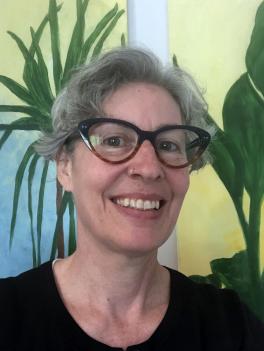
Marie Huard, Pennsylvania State University
Marie Huard is a doctoral candidate in art education at Penn State focused on racial justice curriculum development. Marie values learning about artists whose experiences with race and culture are different from her own as a White woman and believes that all students benefit from seeing themselves reflected in the curriculum. She has published several articles that encourage educators to examine and discuss art with students to foster critical inquiry and belonging including, “The Art of Black Power: Identity and Activism,” "Building Collective Memory: The Documentary Photography of Newsha Tavakolian," and most recently, "Diedrick Brackens: Weaving Stories with Cotton." Having previously taught elementary and middle school art in Philadelphia for seventeen years, Marie has enjoyed working as a graduate assistant with the art history department at Penn State, especially leading fibers workshops at the Center for Virtual/Material Studies and co-producing educator resources at the Palmer Museum of Art.
Co-Creating Curriculum with Elementary Art Teachers: Exploring Black Artists' Stories in Art21 Videos
The Pennsylvania Department of Education's guidelines for Culturally-Relevant and Sustaining Education require teachers to facilitate learning experiences that help students identify, question, and respond to unjust power structures. Discussing work by contemporary artists who address race can help teachers and students deconstruct oppressive narratives and create new narratives towards racial justice. Yet, educators who engage students in conversations about race must navigate a fraught political landscape. Attacks against racial justice efforts in schools have intensified since the 2024 presidential election. In this study, I facilitated and participated in a professional learning community with three elementary art teachers from three Pennsylvania schools with differing racial demographics. I aim to learn how elementary art teachers explore 'Black American Experiences' narrated by Black artists in Art21 videos to co-create art curriculum that potentially supports discussions about race with their students. Using narrative inquiry, I examine how the teachers and I, all White women, discussed the artists' work, the art lessons we created, their experiences teaching those lessons to the students in their classes, and how I negotiated my roles as researcher/participant facilitator.
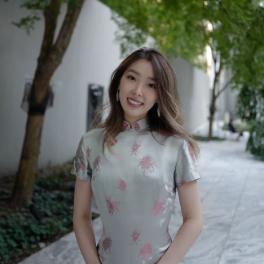
Siyao Lyu, Teachers College, Columbia University
Asian/American Experiences in Mainstream Civic Educational Practice
Asian/American experiences have long been marginalized and misrepresented in American mainstream civic education practices. To confront this situation, Siyao Lyu’s dissertation research examines the practices and potentials of using arts-based strategies in the teaching and learning of Asian/American civics in museums. Guided by Critical Pedagogy, AsianCrit, Multicultural Art Education, and Cultural Citizenship, this qualitative study consists of two parts: a multiple-case study with museum educators, followed by an action research study conducted at an Asian American history museum in the East coast of the U.S. with adult visitors participating in the museum’s core exhibition tour. This study expects to not only provide a tangible example of teaching Asian/American civics through the arts in museum settings for educators in social studies, art, and museums, but more importantly to advocate for resisting anti-Asian racism through art and education in general.
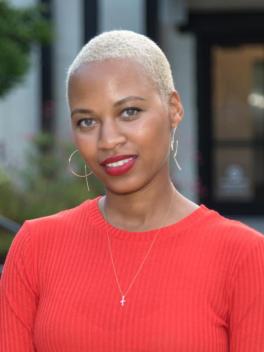
Lynn Robinson, The Ohio State University
Manifesting the Village: Black othermothering, arts-based interventions, and curriculum building toward educator capability
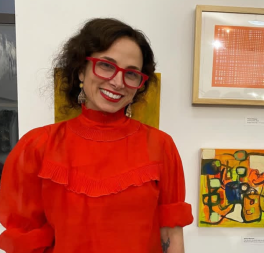
Allyson Montana, Teachers College, Columbia University
Storied Canons: An Examination of the Experiences and Pedagogical Practices of Undergraduate Survey of Art History Instructors
This study examines how art history instructors’ experiences shape their pedagogical approaches to the undergraduate survey course, influencing teaching practices, curricular focus, and engagement with diverse student backgrounds. Guided by culturally responsive teaching, it situates the survey course within an educational context shaped by digital technologies, artificial intelligence, the lasting effects of COVID-19, and ongoing political unrest on campuses. A key finding is that the traditional survey course must evolve to stay relevant. Instructors are called to reimagine both the canon and their methods—not by abandoning the past but by re-engaging with it intentionally. This includes returning to practices like slow looking, tactile engagement, and a more focused selection of artworks, alongside student-centered strategies such as service learning, reflective journaling, and responsive teaching that address today’s student realities. Finally, by exploring instructors’ narratives and identities and their impact on teaching and learner connections, this study highlights broader questions about how educator identity shapes pedagogy, curricular emphasis, and meaningful student relationships in the undergraduate experience.
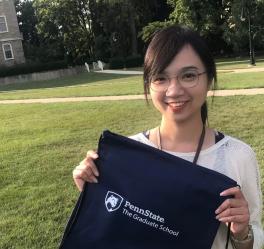
Pin-Hsuan Tseng, Pennsylvania State University
Pin-Hsuan Tseng (曾品璇), a Ph.D. Candidate in Art Education with minors in Women’s, Gender, & Sexuality Studies and Curriculum & Instruction at Penn State University, has received awards internationally, including: Art Education Research Institute (AERI) Honorable Mention Dissertation Award (2025), Pennsylvania Art Education Association Fellows Clyde M. McGeary Scholarship (2024), Dr. John Roe Sustainability Impact Award (2024); Ecology and Environment Interest Group Award from the National Art Education Association (2024), a2ru Scholar Award (2024), Dorothy Hughes Young Endowed Scholarship for Music and Art Education Award (2023-2025), Penn State Student Leadership Scholarship (2023-2024), and Outstanding Art Star in Teaching (Taiwan, 2015). Her work is published in Research in Arts Education (藝術教育研究) and Visual Arts Research journals, as well as chapters in anthologies.
Transnational Tent/Tension: Feminist Tenting Art Pedagogy through Participatory Arts-Based Research with Immigrant Women in the U.S. from East Asia
My yellow tent became a site of resistance to the racism and sexism I experienced after being called a “little yellow woman” in Pennsylvania in 2023, and the impetus for a transnational feminist tenting art pedagogy as the focus of my dissertation. Working with 10 East Asian immigrant women who have lived in the United States from four to thirty years, what began as a private tent has expanded into collective narratives from women originating in China, South Korea, Japan, and Taiwan. I theorize this pedagogy through transnational feminism, posthuman feminism, and artistic tent praxis. Methodologically, the study is participatory arts-based research. Within participants’ intimate spaces, the yellow tent functions as a site for feminist dialogue, collaborative artmaking, and storytelling through transnational objects. Using three cycles of coding analysis, I examine their arts-based narratives, which reveal experiences of (un)belonging, daily discrimination, and persistent stereotypes of East Asian women—such as being perceived as silent, submissive, or confined to family roles. Ultimately, I argue that transnational feminist tenting art pedagogy fosters community-building, opens possibilities for articulating in-between identities, and cultivates posthuman feminist agency. What originated as a personal tent art practice now amplifies immigrant women’s voices and renders visible underrepresented minorities in the United States through a website (https://tentart.org/) developed as part of my dissertation.
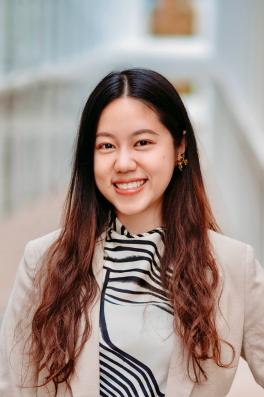
Lingran Zhang, The Ohio State University
Lingran Zhang is a third-year Ph.D. candidate in the Arts Administration, Education, and Policy program at The Ohio State University, specializing in Museum Education. Lingran earned her B.A. in Art History and International & Area Studies from Washington University in St. Louis, and an M.Phil. in Heritage Studies with distinction from the University of Cambridge, where she concentrated on the concept of authenticity in safeguarding intangible cultural heritage. Her current doctoral research investigates how digital museum resources can foster educational equity in rural China. Her scholarship has been recognized with the Dean’s Distinguished University Fellowship and the Outreach and Engagement Graduate Student Engaged Scholar Seed Grant. In addition to her academic work, Lingran has served as a research assistant and educator in leading cultural institutions, including the Cleveland Museum of Art, the Fitzwilliam Museum, ICCROM, and the Beijing Palace Museum. She brings to her research and teaching a commitment to making art and cultural resources accessible, inclusive, and socially responsive.
Bridging Educational Divides: Connecting Rural Communities with Online Museum Resources
This dissertation examines how digital museum resources can strengthen art learning in under-resourced rural schools in China. Grounded in culturally sustaining pedagogy and informed by Bourdieu’s concept of cultural capital, posthumanist theory, and postcritical museology, the study positions museums as socially responsive institutions. Over three years, Lingran conducted action research with more than 80 Grade 5 students in 3 rural schools in Henan, designing and delivering a year-long online art curriculum through the non-profit organization A Class in Childhood. Initial interviews with rural teachers mapped local assets and challenges to inform course design; curriculum impact was then analyzed through students’ pre- and post-surveys, classroom observations, student artworks, reflective journals, and interviews. In parallel, partnerships with 9 national museums generated livestreamed lessons that reached more than 800 rural students. Classroom observations and interviews with teachers and museum professionals provided further insights into effective practices of digital pedagogy. The dissertation contributes empirical evidence for digitally mediated pedagogy, offers practice guidelines for developing inclusive museum resources, advances a theoretical elaboration of museums as socially responsive institutions, and proposes a sustainable model for museum–NPO–rural community collaboration for expanding access to art and cultural resources.
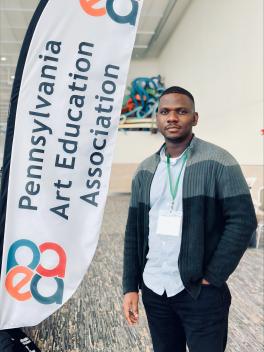
Richard Agbeze, Pennsylvania State University
Richard Agbeze is a fourth-year doctoral candidate in Art Education with a minor in Curriculum and Instruction at Pennsylvania State University. His research interests encompass social justice in art education, culturally responsive pedagogy, Black immigrant experiences, and artistic identity development. He has extensive experience teaching visual arts at both the K-12 and college levels in Ghana and the United States, effectively bridging different educational practices and cultural perspectives in his teaching.
From African to Black: An Arts-based Autoethnography of the Experiences of a Black Immigrant Student
This dissertation examines the process of racial identity formation among Black African immigrants in the United States, with a particular focus on how racialization impacts their acculturation process and ethno-national identity. Drawing on personal narrative, historical context, and scholarly analysis, this study explores how African immigrants often arrive in the United States with a strong sense of cultural distinctiveness, only to confront the reality that dominant society racializes them primarily as “Black.” This change prompts a confrontation with systemic racism and stereotypes that impact their understanding of self and sense of belonging as they adapt to the new social and cultural system. This work contributes to the literature on immigrant adaptation and home–school relations, highlighting how acculturation impacts academic performance and identity development, issues that scholars and practitioners associate with student achievement and well-being. Furthermore, this study informs inclusive curriculum and pedagogical frameworks to explore how Black African immigrant students navigate identity, culture, and belonging, while also providing insights for developing culturally competent and anti-racist art education practices that help affirm and sustain immigrant student identities.
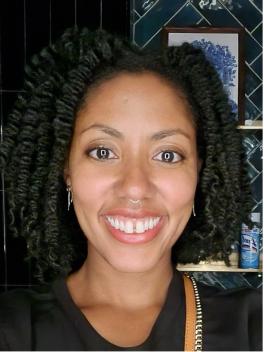
Kandace Stewart, Teachers College, Columbia University
Teacher Archetypes in Urban Public Schools: A Study through Literary Analysis, Focus Groups & Interviews
Given the long trajectory of negative conditions created in public schools through inept administrative actions such as stringent teacher evaluations, non-differentiated professional developments, and rigid mandates that govern curricula and teacher decisions, what are the created conditions that force teachers into stereotypical roles such as archetypes?
The study of archetypes and the language from the Jungian landscape has helped me to clarify a phenomenon in teaching. My study focused on teacher types in under-resourced schools, where the profession deeply contains intertwined emotional labor based on complex systemic barriers, administrative pressures, and the demands of balancing idealism with the harsh realities of the classroom. Often, many teachers undergo a process of individuation when they deeply invest in the conditions of their community. The tension between themselves and outside forces is mimicked within. This cyclical transformation marries crisis and reflection, which fosters change within the individual. Masking has been a very prominent component of the individuation process, providing a disillusioned state of mind. Teachers who undergo emotional investment and commit to being changed for their better ultimately learn to survive, thrive, and or even leave the field physically and/or emotionally.
GRAE Respondents
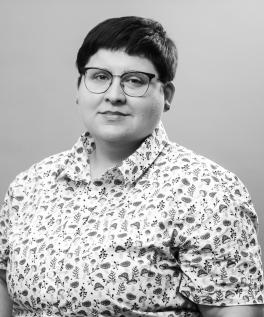
Debra Hardy, PhD
Debra A. Hardy, PhD is an assistant professor of art education at the University of Wisconsin-Milwaukee. Her research areas include the histories of art education, the legacy of Chicago’s Bronzeville neighborhood, social network analysis, dialogics and polyphony, Black feminist histories, counter-cartography, and anti-essentialist teaching practices. She has published in the Journal of Cultural Research in Art Education and in Promoting Civic Engagement through Art Education, with a forthcoming article in Visual Arts Research.
Abstract: “Yes, And”: The Necessity of the Multihyphenate in Art Education
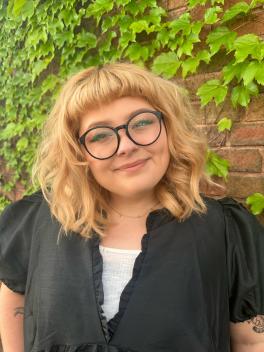
Megan Wanttie, PhD
Abstract: Critical Posthumanism at the Columbus Museum of Art
The purpose of the Graduate Research in Art Education (GRAE) conference is to provide a forum for students from Penn State, Ohio State, and Teachers College to discuss issues and developments in art education that are being opened up by current graduate student research. Since 2005, the GRAE conference takes place each fall semester in a rotation at one of the participating institutions.
AAEP has hosted the Graduate Research in Art Education conference in 2022, 2019, 2015, and 2012. A complete archive of GRAE conference programs and presentations is maintained by Penn State University.
